
Harry Lillis "Bing" Crosby Jr. was an American singer, actor, television producer, television and radio personality, and businessman. The first multimedia star, he was one of the most popular and influential musical artists of the 20th century worldwide. Crosby was a leader in record sales, network radio ratings, and motion picture grosses from 1926 to 1977. He was one of the first global cultural icons. Crosby made over 70 feature films and recorded more than 1,600 songs.

Louis Daniel Armstrong, nicknamed "Satchmo", "Satch", and "Pops", was an American trumpeter and vocalist. He was among the most influential figures in jazz. His career spanned five decades and several eras in the history of jazz. Armstrong received numerous accolades including the Grammy Award for Best Male Vocal Performance for Hello, Dolly! in 1965, as well as a posthumous win for the Grammy Lifetime Achievement Award in 1972, and induction into the National Rhythm & Blues Hall of Fame in 2017.
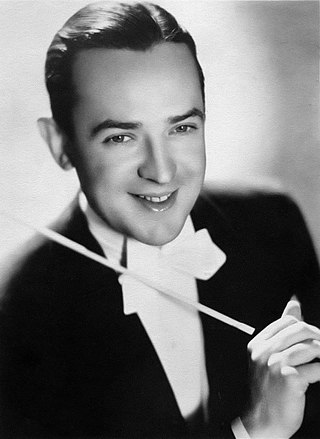
James Francis Dorsey was an American jazz clarinetist, saxophonist, composer and big band leader. He recorded and composed the jazz and pop standards "I'm Glad There Is You " and "It's The Dreamer In Me". His other major recordings were "Tailspin", "John Silver", "So Many Times", "Amapola", "Brazil ", "Pennies from Heaven" with Bing Crosby, Louis Armstrong, and Frances Langford, "Grand Central Getaway", and "So Rare". He played clarinet on the seminal jazz standards "Singin' the Blues" in 1927 and the original 1930 recording of "Georgia on My Mind", which were inducted into the Grammy Hall of Fame.
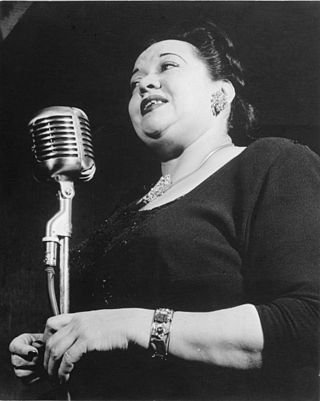
Mildred Bailey was a Native American jazz singer during the 1930s, known as "The Queen of Swing", "The Rockin' Chair Lady" and "Mrs. Swing". She recorded the songs "For Sentimental Reasons", "It's So Peaceful in the Country", "Doin' The Uptown Lowdown", "Trust in Me", "Where Are You?", "I Let a Song Go Out of My Heart", "Small Fry", "Please Be Kind", "Darn That Dream", "Rockin' Chair", "Blame It on My Last Affair", and "Says My Heart". She had three records that reached number one on the popular charts.
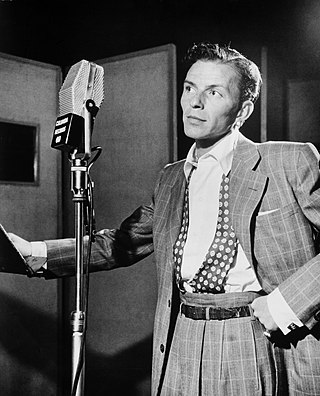
A crooner is a singer that performs with a smooth, intimate style that originated in the 1920s. The style was made possible by better microphones that picked up quieter sounds and a wider range of frequencies, allowing the singer to access a more dynamic range. This suggestion of intimacy was supposedly wildly attractive to women, especially younger ones such as teenage girls, known at the time as "bobby soxers". The crooning style developed out of singers who performed with big bands, and reached its height in the 1940s to late 1960s.

Gary Evan Crosby was an American actor and singer. His parents were Bing Crosby, of whom he wrote a highly critical memoir, and the singer and actress Dixie Lee.

David Ritz is an American author. He has written novels, biographies, magazine articles, and over a hundred liner notes for artists such as Aretha Franklin, Ray Charles, and Nat King Cole. He has coauthored 36 autobiographies, including some celebrities' autobiographies.

Dixie Lee was an American actress, dancer, and singer. She was the first wife of singer Bing Crosby.

"Where the Blue of the Night (Meets the Gold of the Day)" was the theme Bing Crosby selected for his radio show. It was recorded in November 1931 with Bennie Krueger and his Orchestra. The song was featured in a Mack Sennett movie short starring Bing Crosby. Crosby recorded the song on several occasions starting with the November 23, 1931 version with Bennie Kruger and his Orchestra. He next recorded it on July 20, 1940 with The Paradise Island Trio. On July 17, 1945 he recorded it with John Scott Trotter and his Orchestra and his final recording was on April 21, 1954 with Buddy Cole and his Trio for his Musical Autobiography set.
"Embraceable You" is a jazz standard song with music by George Gershwin and lyrics by Ira Gershwin. The song was written in 1928 for an unpublished operetta named East Is West. It was published in 1930 and included in that year's Broadway musical Girl Crazy, performed by Ginger Rogers in a song and dance routine choreographed by Fred Astaire.

The Rhythm Boys were an American male singing trio consisting of Bing Crosby, Harry Barris and Al Rinker. Crosby and Rinker began performing together in 1925 and were recruited by Paul Whiteman in late 1926. Pianist/singer/songwriter Barris joined the team in 1927. They made a number of recordings with the Whiteman Orchestra and released singles in their own right with Barris on piano. They appeared with the Whiteman orchestra in the film King of Jazz, in which they sang "Mississippi Mud", "So the Bluebirds and the Blackbirds Got Together", "A Bench in the Park", and "Happy Feet". They are best remembered for launching Crosby's solo career, one that would make him the greatest song charting act in history and one of the most influential entertainers of the twentieth century.

Al Rinker was an American musician who began his career as a teen performing with Bing Crosby in the early 1920s in Spokane, Washington. In 1925 the pair moved to Los Angeles, eventually forming the Rhythm Boys trio with Harry Barris.
"Song of the Dawn" was a 1930 song, first introduced in the musical film King of Jazz. The song was originally written for Bing Crosby, who lost the part to John Boles, another actor in the film, due to Crosby being jailed for a motoring offence.
Charles Rinker was an American lyricist who worked frequently with Gene de Paul and Bob Rothberg, among others. His older brother, Al Rinker, was one of the famous Rhythm Boys with Bing Crosby in the late 1920s. His sister, Mildred Bailey, was a popular and influential American jazz singer during the 1930s.

"At Your Command" is a 1931 song recorded by Bing Crosby on June 24, 1931 with piano accompaniment by Harry Barris. The lyrics were written by Bing Crosby and Harry Tobias, The music was composed by Harry Barris.
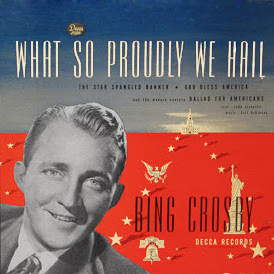
What So Proudly We Hail is a compilation album of phonograph records by Bing Crosby released in 1946 featuring songs that were sung by Crosby in an American-type patriotic style. This album featured Bing singing patriotic songs such as: "Ballad for Americans", "God Bless America" and "The Star-Spangled Banner". The songs were later presented in a 33 1/3 rpm split set with The Man Without a Country.

Cowboy Songs is a compilation album of phonograph records by Bing Crosby released in 1939 featuring Western songs.
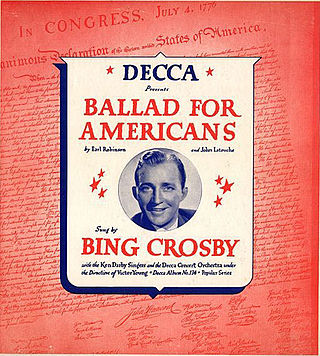
Ballad for Americans is a studio album of phonograph records by Bing Crosby released in 1940 featuring the popular "Ballad for Americans" sung by Crosby in an American-type patriotic style. In 1946, the two records in this album were put into a new album called What We So Proudly Hail. This was Crosby's first studio album that was not a reissue of earlier singles.

'Bing and the Dixieland Bands is a Decca Records album by Bing Crosby featuring songs with a Dixieland flavour which was issued as a 10” LP with catalog No. DL5323 and as a 4-disc 78rpm box set (A-852) and as a 4-disc 45rpm set (9–232).















